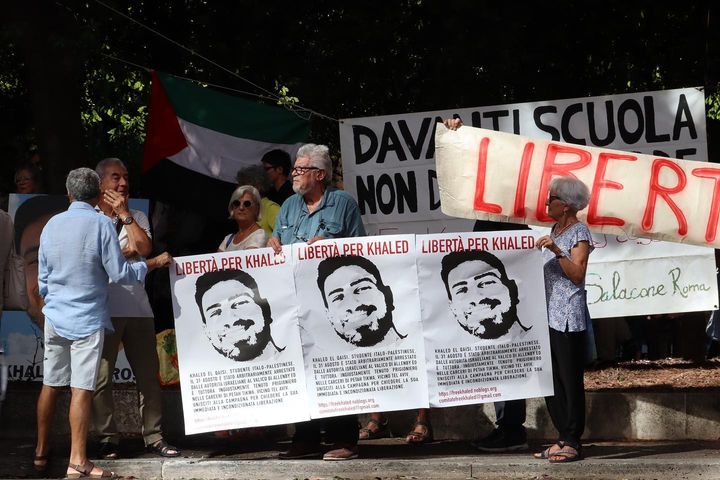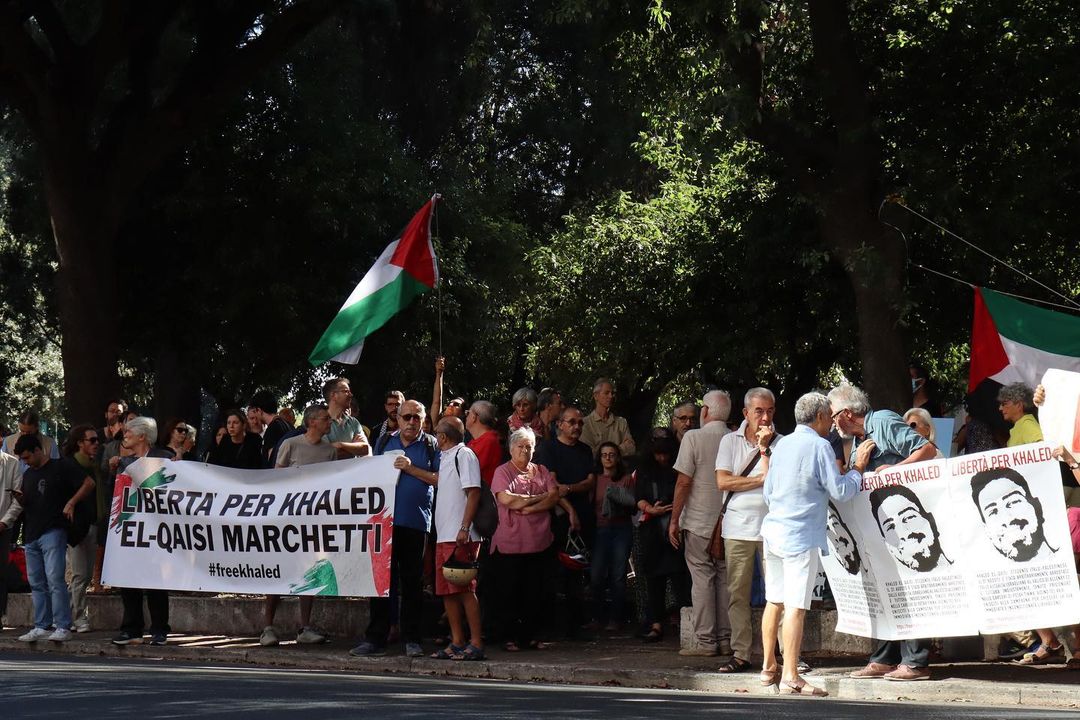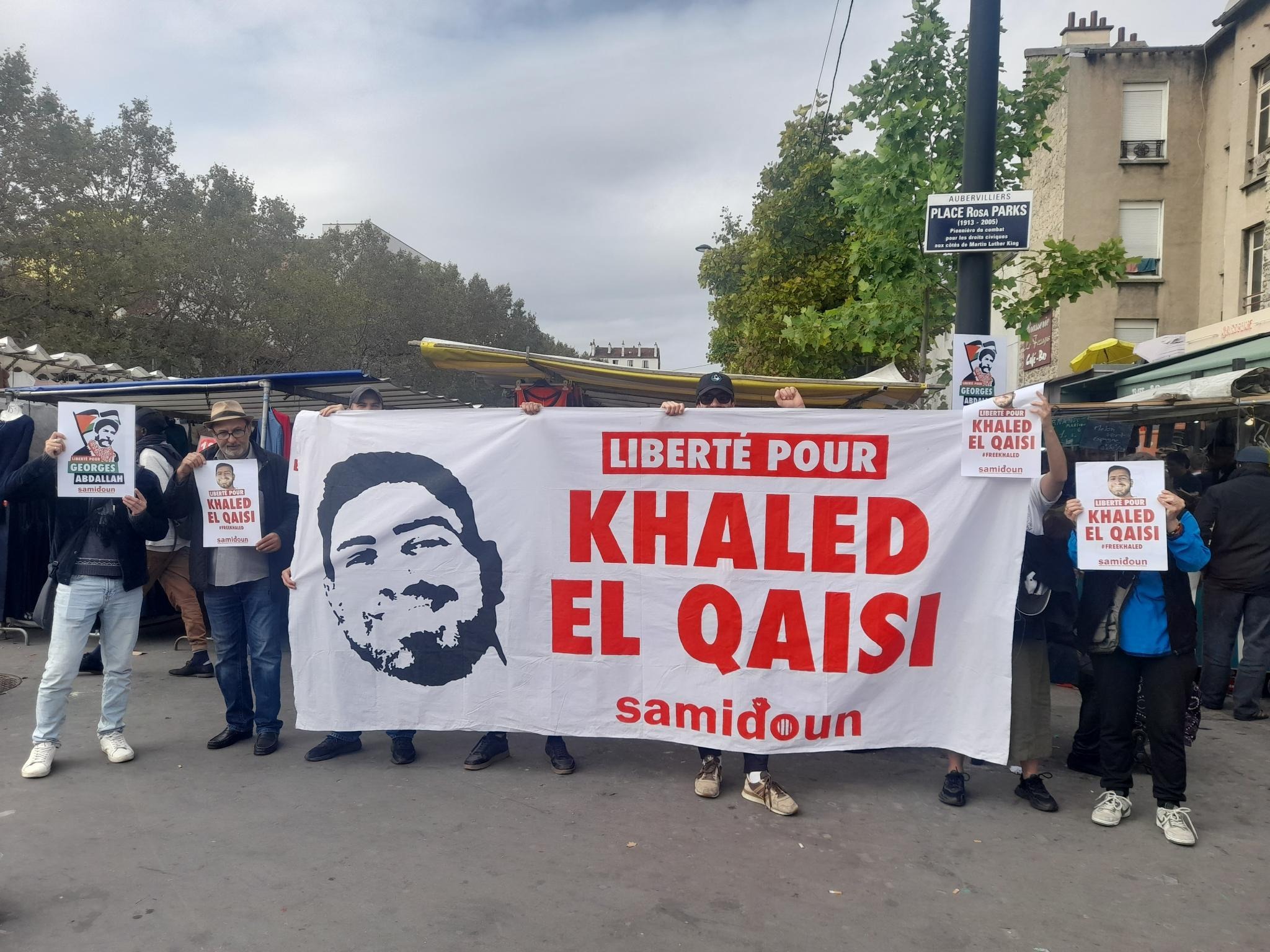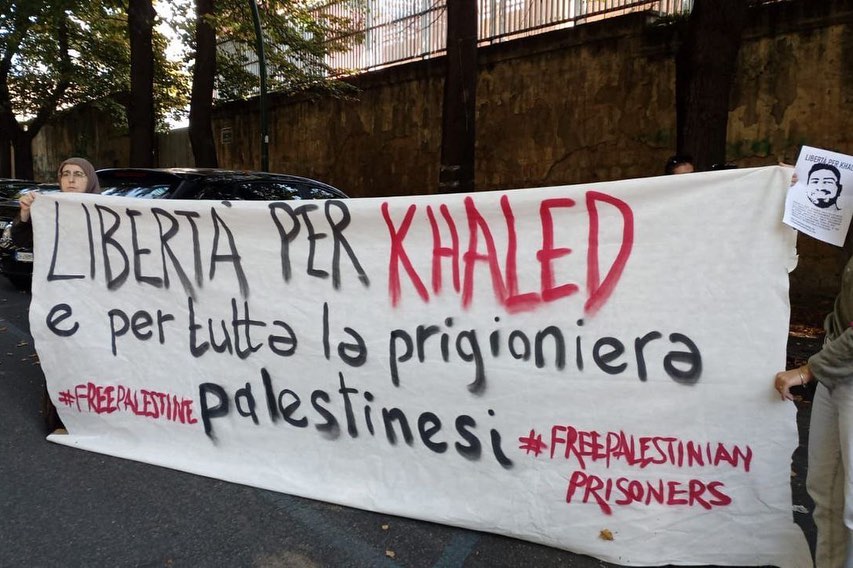
Palestinian-Italian researcher Khaled el-Qaisi was released from Israeli detention on Sunday, 1 October, after his uncle paid a financial bail guarantee; however, he is subjected to a travel ban and cannot return to Italy. He must remain in Palestine until at least 8 October — the next court hearing — although he is not under house arrest, his wife Francesca Antinucci told Italian outlet Pagine Esteri:
“For now I can only say that it is not a question of house arrest but that until 8 October there is a ban on leaving the country and he is obligated to remain at the disposal of the judicial authorities,” Antinucci specified. Meanwhile, the family members still have no certain information and are still unable to contact Khaled.”
The Comitato Free Khaled, representing his family and friends, issued a statement, saying:
“We confirm Khaled’s release from prison. It’s comforting news even if a state of limitation of freedom remains with investigations still underway…We will give updates on his condition and release details once direct contact with him has been established. In this context, the committee for Khaled’s release and his family remain vigilant in a situation that is still very delicate, until its full and definitive resolution.”
This news comes one day after a national day of action in Italy, where protests were held in Rome, Bologna, Napoli, Cagliari, Trieste, Ancona, L’Aquila (with another demonstration forthcoming in Milan on Monday, 2 October at Corso Sempione 27 at 6 pm. These demonstrations gathered outside the offices of RAI, the Italian national broadcaster, to demand appropriate coverage of Khaled’s case in the mainstream national media. These demonstrations were organized by a wide range of organizations in Italy, including the Giovani Palestinesi d’Italia (Palestinian Youth of Italy), Centro Culturale Handala Ali, and many left and progressive organizations.

In Aubervilliers, France, Samidoun Paris Banlieue joined the day of action as part of its Palestine Stand, carrying a large banner calling for freedom for Khaled el-Qaisi:

El-Qaisi is a translator, researcher and student in the Department of Oriental Languages and Civilizations at Sapienza University of Rome who was detained by Israeli occupation forces since 31 August. El-Qaisi, a Palestinian and Italian citizen, was visiting Palestine with his wife and four-year-old son. While leaving Palestine at the bridge to Jordan, he was suddenly seized by occupation forces and handcuffed in front of his young child. In Italy, El-Qaisi works with the Giovani Palestinesi d’Italia (Palestinian Youth of Italy) and is the co-founder of the Palestinian Documentation Center, a project that works to archive, translate and make accessible Palestinian historical documents, items and works. Occupation officials have not brought any charges against El-Qaisi.

A group of Palestinian and Italian academics wrote an open letter calling for El-Qaisi’s freedom and highlighting previous cases of Palestinians in diaspora, particularly European citizens who have been detained by the occupation (original in Italian, translation below):
El-Qaisi: Legal barbarism to silence the diaspora
We write this letter as Italian, Italian-Palestinian and Palestinian academics with great concern for the fate of Khaled el-Qaisi, arrested at Allenby Bridge by the Israeli occupation army on 31 August 2023, as he was preparing to return home with his wife and his son after a holiday spent in Bethlehem, his city of origin on his father’s side.
Khaled – student of oriental languages and civilizations at Sapienza University, intellectual and translator of books of fundamental importance for Palestinian political and cultural history – has been detained for almost a month in Israeli prisons without charges, deprived of the possibility of meeting with his lawyer. Amnesty International reported that Khaled was subjected to psychological and physical harassment during detention, including “sleep deprivation, threats, verbal abuse and prolonged imposition of stress positions” which, Amnesty continues, “potentially amount to a crime under international law”.
All this is in contrast with the declarations of the Italian government, which instead tried to reassure our country about Khaled’s good condition. Equally violent and inhumane is the way in which the Israeli military treated Khaled’s family, his wife and their 4-year-old son, who, after witnessing the arbitrary arrest of their husband and father, were deprived of money and phones and left at the border in a state of extreme precariousness and violation of their most basic rights, even more serious considering the presence of a child already certainly traumatized by the events. Only thanks to the solidarity of some Palestinian women on the spot, the family managed to reach Jordan and go to the Italian embassy for the necessary support.
Israeli arrest and detention systems have operated outside of international law for decades. According to Amnesty International, there are over 5 thousand Palestinians currently detained in Israel (illegally deported from the occupied territories) and among these 1,260 are in prison without charge or trial, thanks to Israel’s use of administrative detention which can be renewed indefinitely for 6 month periods, allows Israel to detain citizens without any evidence, charge or trial, often for many years, in total disregard of international law and basic human rights.
As academics we are deeply concerned about the conditions and nature of Khaled’s detention, which represents a further escalation of Israel’s repression against students, intellectuals or ordinary citizens whose only crime is to be active or visible in various capacities in the promotion of culture and rights of their people in the diaspora.
Often these are citizens of other countries, of Palestinian origin, who simultaneously hold – thanks to great sacrifices and perseverance – a Palestinian passport or a residence permit in the West Bank, including Jerusalem, or in Gaza. They are “Guilty of Palestine”, as the slogan of the campaign for Khaled’s release which has been activated in recent weeks has effectively summed up.
This is not the first time this has happened in recent years. In September 2016, a British citizen, Fayez Sharary, was arrested in conditions similar to those of Khaled, in front of his wife and 3-year-old daughter, as he was preparing to return home after holidays. In this case, it was an Israeli military judge who ordered his release, after having ascertained the use of torture and forced confession on the detainee and declaring the charges irrelevant.
Mustafa Awad, Belgian citizen and dancer of Palestinian origin, was detained for 253 days in Israeli prisons and freed thanks to a vast campaign in favor of his release and the legal assistance of the well-known Israeli lawyer Lea Tsemel, who managed to demonstrate the unfoundedness of the accusations of “terrorism” leveled against him.
And, again, the French-Palestinian lawyer Salah Hamouri detained in “maximum security” administrative detention from March 2022 to December 2022 and then deported to France after being deprived of his residence permit and Jerusalem identity card.
What is underway is a clear attempt to silence the voices of the diaspora and at the same time to deprive student citizens and intellectuals of the diaspora of the right to reside, return, or visit their families and loved ones in the occupied Palestinian territories.
As Italian and Palestinian intellectuals of the diaspora we express deep concern at the lack of attention that our media has given to Khaled’s arbitrary detention.
We call upon the Italian government and the deputy prime minister and foreign minister Tajani, who recently stated that our country “does not intend to interfere with Israeli judicial activities” (!), to instead interfere, interceding to stop the legal barbarity of detention without charge , with detention conditions profoundly harmful to Khaled’s dignity and health and in violation of the most fundamental human rights.
The release of Khaled el-Qaisi must be called for immediately. Unless our government considers Khaled, as an Italian-Palestinian, a second or third class Italian and the diplomatic relationship with Israel is more important than the dignity of our fellow citizen.
First signatories:
Ruba Salih, University of Bologna
Carlo Rovelli, Aix-Marseille University
Massimo Cacciari, San Raffaele University, Milan
Wasim Dahmash, formerly University of Cagliari
Alessandro Petti, Royal Institute of Art, Stockholm University
Sandro Mezzadra, University of Bologna
Ada Barbaro, Sapienza University of Rome
Giovanni Levi, Ca’ Foscari University of Venice
Sara Farris, Goldsmiths University of London
Nicola Perugini, University of Edinburgh
Alessandra Mezzadri, School of Oriental and African Studies, University of London
Francesca Biancani, University of Bologna
Leopoldina Fortunati, University of Udine
Leonardo Capezzone, Sapienza University of Rome
Diana Carminati, formerly University of Turin
Daniela Pioppi, University of Naples L’Orientale
Riccardo Badini, University of Cagliari
Simone Sibilio, University of Venice Ca’ Foscari
Cristiana Baldazzi, University of Trieste
Marco Ramazzotti, Sapienza University of Rome
Roberta De Monticelli, Former lecturer of Philosophy of the Person at the universities of Geneva and San Raffaele of Milan
Luigi Daniele, University of Nottingham Trent
Giacomo Costa, former full professor of Political Economy at the University of Pisa
Marco Ammar, University of Genoa
Roberto Beneduce, University of Turin
Simona Taliani, University of Turin
Paola Rivetti, University of Dublin
Maria Chiara Rioli, University of Modena and Reggio Emilia
Annalisa Frisina, University of Padua
Paola Gandolfi, University of Bergamo
Patrizia Zanoli, University of Venice Ca’ Foscari
Barbara De Poli, University of Venice Ca’ Foscari
Silvia Federici, Hofstra University (Hempstead, New York)
Sara Borrillo, University of Rome Tor Vergata
Rosita Di Peri, University of Turin
Claudia Ortu, University of Cagliari
Francesco Bachis, University of Cagliari
Lea Nocera, University of Naples L’Orientale
Andrea Brigaglia, University of Naples L’Orientale
Valerio Cordiner, Sapienza-University of Rome
Stefania Bentonati, University of Pavia
Alessandra Brezzi, Sapienza-University of Rome
Lucy Ladikoff, formerly University of Genoa
Adolfo La Rocca, Sapienza-University of Rome
Maria Elena Paniconi, University of Macerata
Andrea Cottino, University of Turin
Angelo D’orsi, University of Turin
Elisabetta Benigni, University of Turin
Arturo Monaco, Sapienza-University of Rome
Pamela Murgia, University of Macerata
Nicola Melis, University of Cagliari
Samidoun Palestinian Prisoner Solidarity Network urges continued vigilance to ensure the end of the persecution of Palestinian-Italian researcher, scholar and citizen Khaled El Qaisi. The Italian government and all concerned parties must take immediate action at all levels to ensure his safety and his immediate freedom, including his freedom to travel freely and to leave Palestine, to return to Italy, and to return to his homeland Palestine in the future.
Discover more from Samidoun: Palestinian Prisoner Solidarity Network
Subscribe to get the latest posts sent to your email.




